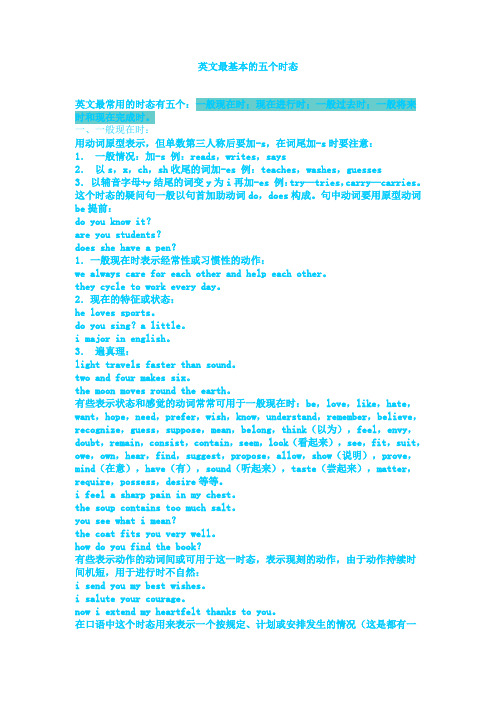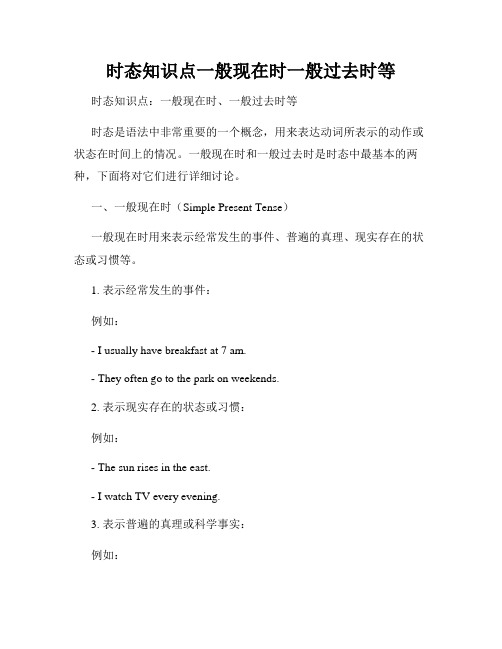一般现在时和一般过去时
一般现在时与一般过去时

一般现在时一.三单变化:1.多数在动词后+s 例如:play — plays like — likes2.以s ,x ,sh ,ch , o 结尾的+es,例如:go — goes wash — washes3.以辅音字母加y结尾,把y改成i再加es例如:fly — flies cry — cries在一般现在时中,当主语是第三人称单数时,谓语动词要用第三人称单数形式,即常在动词原形后加-s或-es。
二.哪些主语是第三人称单数呢?现归纳总结如下:一、人称代词he, she, it是第三人称单数。
如:He likeswatchi ng TV. 他喜欢看电视。
她十二点吃午餐。
It lookslike a cat. 它看起来像只猫。
二、单个人名、地名或称呼作主语;是第三人称单数。
如:①Han Mei lookslike her mother. 韩梅看起来像她的母亲。
②Beijin g is in China.北京在中国。
③王叔叔经常做蛋糕。
三、单数可数名词或"this / that / the+单数可数名词"作主语时,是第三人称单数。
如:①A horseis a useful animal. 马是有用的动物。
②This book is yours.这本书是你的。
③That car is red. 那辆小汽车是红色的。
④这只猫是露茜的。
四、不定代词so meone, somebo dy, nobody, everyt hing,someth ing等及指示代词t his, that作主语时,是第三人称单数。
如:①大家到齐了。
②Thereis someth ing wrongwith the watch.这块手表有毛病。
③This is a pen. 这是一支钢笔。
一般现在时和一般过去式区分

一般现在时通常与时间状语如“always”、“often”、“every day”等连用;一般过去式则与时间状语 如“yesterday”、“last week”、“in 2022”等连用。
常见误区提醒
误区一
误区三
认为一般现在时只用于现在时态,实际上它 还可以表示将来时态,如“The train leaves at 5 o'clock.”(火车5点钟开。)
练习题与答案解析
1 2 3
答案
goes; walked解析第一空表示经常性动作,用一般现在时第三人称 单数形式“goes”;第二空表示昨天发生的动作, 用一般过去式“walked”。
练习题二
判断下列句子时态是否正确,不正确的请改正。
练习题与答案解析
1. I am always late for school. ( )
两者在时态上的区别
时间点不同
一般现在时表示现在的动作或状 态,而一般过去时表示过去的动
作或状态。
动词形式不同
一般现在时使用动词原形(第三 人称单数动词后加-s/-es),而 一般过去时使用动词的过去式。
使用情境不同
一般现在时用于描述经常性、习 惯性或普遍性的动作或状态,以 及客观事实或真理;而一般过去 时用于描述过去某个时间发生的
go动词
现在时为go,过去式为 went
eat动词
现在时为eat,过去式为 ate
04 句式结构差异分析
一般现在时句式结构特点
主语 + 动词原形(或第三人称单数形式) + 其他成…
I like apples.(我喜欢苹果。)
表示经常性、习惯性或普遍性的动作或状态。例如
She always wears a smile.(她总是面带微笑。)
一般现在时和一般过去时

一般现在时和一般过去时初中英语动词时态一.一般现在时一般现在时用法:1.现阶段经常性、习惯性动作;2.目前的状态;3.客观真理。
构成:用于是第三人称单数时,作谓语的行为动词要加词尾-s(-es),其他人称和数用动词原形。
句型:it is / they are / I am (动词要用原型,除单数第三人称外)主要用于下面几情况:1) 描述当前时间内经常出现、反复发生的动作或存在的状态。
在这种情景中,句子常带有表示频率的时间状语:always , every day , often , once a week (month , year , etc.) , sometimes , seldom , usually等等,以表示句中的动作或状态是习惯性的、经常性的。
例如:They raise ducks as a sideline .他们以养鸭为副业。
She doesn't often write to her family, only once a month. 她不常给家里写信,仅一月一封而已。
I cycle to work every day .我每天骑自行车上班。
It seldom rains here .这儿很少下雨。
示将来要发生的动作。
例如:I'll tell him the news when he comes back. 他回来时,我将告诉他这个消息。
If you take the job , they will talk with you in greater details. 如果你接受这份工作,他们将和你谈谈细节。
用于一般现在时的副词,除了上面提到的一些表示频率的以外,常见的还有:now, today , nowadays等等。
一般现在时是英语中应用最广泛的时态之一。
它表示1)经常性、习惯性的动作或存在的状态。
e.g. I go to school on foot. He is very busy now. 2)表示主语的特征、性格、能力、爱好等。
一般现在时与一般过去时

不规则动词的过去式 (三).不规则动词的过去式需单独记忆,下面是一些常见 不规则动词的过去 需单独记忆, 的过去时。 的过去时。 am/is-was are-were do-did sing-sang
/iwps/ httpபைடு நூலகம்///kingsoftwps/
行为动词
一般现在时
He works in a hospital.
一般过去时
He worked in a hospital.
He doesn't work in a hospital He didn't work in a hospital. Does he work in a hospital? Did he work in a hospital? Yes, he does. No, he doesn't. Yes, he did. No, he didn't.
3)标志词: )标志词: 及相关短语。 ① yesterday及相关短语。 及相关短语 例如:yesterday 例如: morning/afternoon/evening 昨天上午/下 昨天上午 下 晚上。 午/晚上。 晚上 时间状语”构成的短语。 ② “last+ 时间状语”构成的短语。 例如: 昨晚/上 例如:last night/month/spring/year 昨晚 上 个月/去年春天 去年。 去年春天/去年 个月 去年春天 去年。 一段时间+ago”组成的短语。 ③ “一段时间 ”组成的短语。 例如: 例如:three days ago 三天以前 four years ago四年以前。 四年以前。 四年以前 介词+ 时间名词”组成的短语。 ④ “介词 时间名词”组成的短语。 例如: 例如:in 1999 在1999年;on the morning of 年 December 25th 在12月25号早 月 号早
一般过去时和一般现在时

一般现在时
1) 表示经常/习惯的动作或现在的存在状态
2) 表示客观事实或普遍真理。
3) 表示主语的特征、性格、能力等
一般现在时(present simple tense)表示包括“现在”在内的一段时间内经常发生的动作或存在的状态。一般现在时是以动词原形表示的,当主语为第三人称单数时,需要在行为动词原形后加-s或-es,其构成方法与名词复数的构成法一样
2)表示过去发生的某一动作对现在造成的影响或产生的结果
3)表示刚刚完成的动作,常与just连用
4)表示过去的动作,但时间不定或不明,多用于问句,常和yet连用.
5)表示过去有过某种经历,而这种经历不可能为以ቤተ መጻሕፍቲ ባይዱ的行动所抹杀或否定。常用状语有never,ever,once,twice,before等。
一般过去时
一般过去时用来表示过去某一时间所发生的动作或存在的状态。通常句中要有表示过去的时间状语。
一般过去时由动词的过去式表示,动词be有was,were两个过去式,was用于第一、三人称单数,were用于其他情况。
构成:have/has+动词过去分词
用法:
1)表示过去发生而持续到现在而且还可能继续下去的动作或状态,往往和表示一段时间的状语连用,表明所持续的时间。
�
英文最基本的五个时态

英文最基本的五个时态英文最常用的时态有五个:一般现在时;现在进行时;一般过去时;一般将来时和现在完成时。
一、一般现在时:用动词原型表示,但单数第三人称后要加-s,在词尾加-s时要注意:1.一般情况:加-s 例:reads,writes,says2.以s,x,ch,sh收尾的词加-es 例:teaches,washes,guesses3.以辅音字母+y结尾的词变y为i再加-es 例:try—tries,carry—carries。
这个时态的疑问句一般以句首加助动词do,does构成。
句中动词要用原型动词be提前:do you know it?are you students?does she have a pen?1.一般现在时表示经常性或习惯性的动作:we always care for each other and help each other。
they cycle to work every day。
2.现在的特征或状态:he loves sports。
do you sing?a little。
i major in english。
3.遍真理:light travels faster than sound。
two and four makes six。
the moon moves round the earth。
有些表示状态和感觉的动词常常可用于一般现在时:be,love,like,hate,want,hope,need,prefer,wish,know,understand,remember,believe,recognize,guess,suppose,mean,belong,think(以为),feel,envy,doubt,remain,consist,contain,seem,look(看起来),see,fit,suit,owe,own,hear,find,suggest,propose,allow,show(说明),prove,mind(在意),have(有),sound(听起来),taste(尝起来),matter,require,possess,desire等等。
时态知识点一般现在时一般过去时等

时态知识点一般现在时一般过去时等时态知识点:一般现在时、一般过去时等时态是语法中非常重要的一个概念,用来表达动词所表示的动作或状态在时间上的情况。
一般现在时和一般过去时是时态中最基本的两种,下面将对它们进行详细讨论。
一、一般现在时(Simple Present Tense)一般现在时用来表示经常发生的事件、普遍的真理、现实存在的状态或习惯等。
1. 表示经常发生的事件:例如:- I usually have breakfast at 7 am.- They often go to the park on weekends.2. 表示现实存在的状态或习惯:例如:- The sun rises in the east.- I watch TV every evening.3. 表示普遍的真理或科学事实:例如:- Water boils at 100 degrees Celsius.- The earth revolves around the sun.4. 表示感觉、看法、经验等个人态度:例如:- I love chocolate.- She hates spiders.注意事项:- 在第三人称单数形式中,动词要加上"-s"或"-es"。
- 对于一些规则动词,如work、study等,第三人称单数形式只需要加上"-s"。
- 对于以辅音字母加"y"结尾的动词,要将"y"改为"i"并加上"-es";对于以元音字母加"y"结尾的动词,直接加上"-s"。
二、一般过去时(Simple Past Tense)一般过去时用来表示过去发生的动作或状态,常常与具体的时间状语连用,如yesterday、last week等。
1. 表示过去发生的事件:例如:- I visited my grandparents last weekend.- They watched a movie together yesterday.2. 表示过去的习惯或状态:例如:- He used to live in New York.- She had a pet dog when she was a child.3. 表示过去的真理、科学事实或历史事件:例如:- The dinosaurs became extinct millions of years ago.- Columbus discovered America in 1492.4. 表示间接引语中的陈述句:例如:- He said he loved her.注意事项:- 对于大多数动词,我们只需要在动词原形的基础上加上"-ed"。
一般现在时与一般过去时

大家来找茬
I goes to school everyday. Miss Smith teach English. My watch sayes ten to five. He arrives in hangzhou an hour ago. She were an orphan and gave piano lessons to
注:表示过去反复的动 作或习惯的动作时也 得用would或used to 加动词原形。
3.At that time she spoke english very well.
表示主语过去的特征 或状态、行为等。
4.I wrote a letter yesterday. 表示在过去某段时间 内完成的动作。
2.He never wears a hat in 表示习惯、能力、特征、
winter.
性格或说话时的感觉、状
态等。
3.The earth moves around 表示客观事实或普遍真理。 the sun.
Knowledge is power.
4.The meeting is at nine 表示按规定要发生的未来的动作或
tomorrow morne leave start stay return begin 等
Train leaves at eight pm. 动词,后面常接时间状语。)
5.What time is it now? 表示说话时刻的状态或情况。
主语为第三人称时:
- 1、下载文档前请自行甄别文档内容的完整性,平台不提供额外的编辑、内容补充、找答案等附加服务。
- 2、"仅部分预览"的文档,不可在线预览部分如存在完整性等问题,可反馈申请退款(可完整预览的文档不适用该条件!)。
- 3、如文档侵犯您的权益,请联系客服反馈,我们会尽快为您处理(人工客服工作时间:9:00-18:30)。
否定: didn’t+动原
We didn’t go swimming last weekend
疑问: Did+主+动原 …? Did you go swimming last weekend?
1. Jack ___ to go to school by bike every day. ( have ) 2. My mother often ___ to work . ( walk ) 3. Sometimes Lucy _________ lunch at home .( not have ) 4. Where ___ your sister ____ ? ( work )
stopped planned tripped
studied carried
用法 1、表示过去某个时间发生的动作或存在的状态。
He was here yesterday. I got up at six thirty yesterday morning. My father was at work yesterday afternoon. Did you have a good time last summer?
4.They _d_o_n__’t_g_o_____ shopping on Monday. (not go 5.Tom _d_o_e day. (not ride) 6. My parents ___d_o_n_’_t_li_k_e___(not like ) fish. 8. What _d_o_____ you __d_o?(do ) 9.Where d_o_e_s___ your uncle _w__o_rk___? (live) 10. Whend_o_e_s_____she usually ____g_e_tup?( get)
2、表示过去经常或反复发生的动作。 My father often went to work by bus last year. When I was a child, I often listened to music.
构成
肯定: 主+ 动词过去式 We went swimming last weekend
一般现在时与一般过去时
一般现在时
一般现在时
知识结构
构成 用法 常用时间
1。主语+ 动词原形 2。 主语+ 动词的s/ es 1、表示经常、习惯性动作。 Tom often goes swimming
2、表示一种客观 事实或真理。
The moon is round。
always 总是 sometimes 有时 often / Usually经常 every day /week /year
look play start live hope use
3、末尾只有一个辅音字母的
stop
重读闭音节词,先双写这
plan
个辅音字母,再加—ed
trip
4、结尾是“辅音字母+y”的动词, study
先变“y”为“i”再加—ed
carry
looked played started lived hoped used
二、主语为三人称单数时,
肯定:主+ 动词的 s/ es Tom often goes swimming. 否定: doesn’t+动原 Tom often doesn’t go swimming. 疑问: does+主+动原 …? Does Tom often go swimming?
Yes , he does . / No , he doesn’t.
动词三人称单数形式的构成
构成规则
例词
1、一般在动词原形末尾加– s
look looks
start starts
2、结尾是 o, s , sh, ch , 的动词加 – es
go –goes
pass—passes
wash –washes watch –watches 3 、结尾是“辅音字母+y”的动词, 先变“y”为“i”再加
1. He _t_e_a_c_h_eEsnglish in a schootel.aIc_h____maths in a
school. ( teach) 2. I often __w_a_t_c_h_________TV. (watch ) My brother often ___r_e_a_d_s__books .(read) 3. He ___h_a_s________ classes every day. (have)
-es
study –studies
carry –carries
play --plays (元音字母+y 的,则不变)
一、主语不是三人称单数时
肯定: 主+ 动词原形 We often go swimming. 否定: don’t+动原 We often don’t go swimming 疑问: Do+主+动原 …? Do you often go swimming?
Yes , we do. / No , we don’t.
1. I often ____ letters to my friend. ( write ) 2. They usually ___ playing football after school . (like ) 3. Sometimes we____ _____ in PE class .( not run ) 4. When ___ you ____ up every day ? (get ) 5. The students _______ lessons on Sunday .( not have )
一般过去时
一般过去时
知识结构
构成 用法 常用时间
主语+动词的过去式
1、表示过去某个时 间发生的动作或 存在的状态。
2、表示过去经常或 反复发生的动作。
yesterday last night in 1990 two days ago
规则动词过去式的构成
构成规则
例词
1、一般在动词原形末尾加– ed 2、结尾是 e 的动词加 -- d
